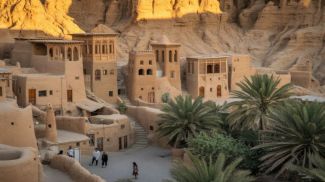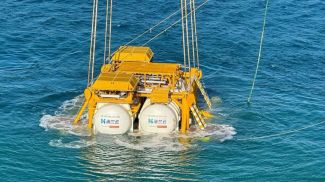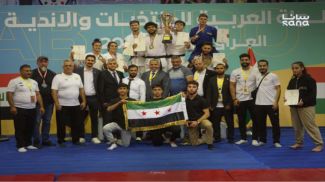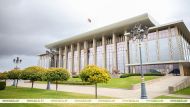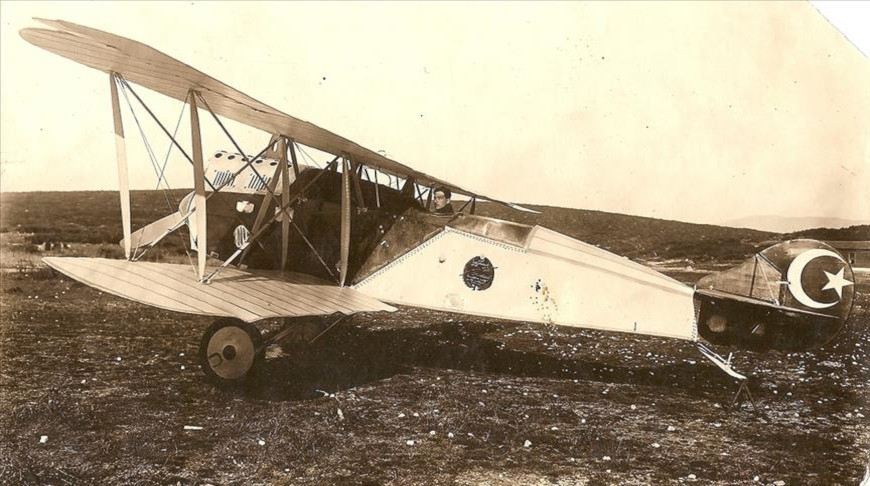
ISTANBUL, 18 July (BelTA - Anadolu) - Vecihi Hurkus, who etched his name
in golden letters in the annals of Turkish aviation, was born in
Istanbul on Jan. 6, 1896.
Hurkus attended primary school in Bebek district and then went to Fuyuzati Osmaniye Middle School in Uskudar district and Pasakapisi High School before moving on to graduate from the Tophane School of Art.
In 1912, after voluntarily joining the Balkan Wars, he became the commander of a prisoner of war camp at Beykoz Serviburun under the Istanbul Central Command.
Seeking to fulfill his dreams of aviation, Hurkus attended the Aviation Machinist School and after graduating was sent to the Baghdad Front as a machinist during World War I.
But after being injured in a plane crash on Feb. 2, 1916, he returned to Istanbul.
Upon his recovery, Hurkus enrolled in the Aviation School in Yesilkoy and made his first flight on May 21, 1916, graduating as a pilot on Nov. 15, 1916.
Hurkus was assigned to the 7th Aviation Division in the Caucasus Front in 1917, where he made history by becoming the first Turkish aviator to shoot down a Russian plane.
In October 1917, his own aircraft was shot down by the Russians.
To prevent the aircraft from falling into enemy hands, Hurkus set it on fire and was taken prisoner, later being sent to Nargin Island in the Caspian Sea.
He escaped with the help of Azerbaijani Turks and returned to Istanbul towards the end of World War I, where he was assigned to the Istanbul Air Defense Battalion.
During the Turkish War of Independence, Hurkus conducted successful reconnaissance flights and shot down a Greek aircraft, earning him the distinguished honor of receiving the Turkish Grand National Assembly's commendation three times and the red-striped Independence Medal.
Focusing on aircraft design, Hurkus utilized leftover materials from captured Greek planes to produce Türkiye’s first aircraft, the Vecihi K-VI, in 1924.
He made an unauthorized flight with the Vecihi K-VI on Jan. 28, 1925, for which he was subsequently punished.
He was honored as the pioneer aviator of Türkiye among the founders of the Turkish Aeronautical Association (THK), established in Türkiye on Feb. 16, 1925, and included among the founders.
Continuing to design new aircraft models, Hurkus rented a carpenter's workshop in Kadikoy district of Istanbul, where he built the Vecihi XIV aircraft within three months.
He made the first flight of the two-seat single-engine sport and training aircraft on Sep. 27, 1930 in the Fikirtepe neighborhood of Kadikoy.
The Vecihi XIV was the country’s first civilian aircraft and his second creation.
Hurkus sought flight permission for the Vecihi XIV but was not granted a navigation certificate.
He disassembled the aircraft and sent it by rail to Prague to obtain necessary certifications from a Czechoslovakian committee.
Hurkus returned to Türkiye on April 25, 1931 after receiving the required documents.
In 1932, he established the country’s first civilian aviation school, the Vecihi Civil Aviation School (VSTM), where 12 students enrolled, including two girls.
As he continued to build seaplanes, Hurkus received assistance from businessman Nuri Demirag, who donated 5,000 liras, the cost of an aircraft at the time.
Completing the Nuri Bey aircraft in 92 days, Hurkus flew it over Besiktas.
With 74 students, including four girls, registered for Turkish Aviation School Hurkus and some of his students went to Russia for training.
Following the successes of the Turkish Aviation School in Istanbul, the school also opened in Ankara and Adana.
Turkish aviation's most remarkable figure continued to contribute significantly to the field throughout his life.
His impact spanned from his pioneering flights and aircraft designs to his efforts in establishing aviation education and commercial ventures in Türkiye.
Despite facing various challenges and setbacks, Hurkus persisted in his mission to advance Turkish aviation.
He established the Vecihi Hurkus Aircraft Factory and trained numerous pilots and engineers through the THK.
His contributions were not limited to aviation technology and education but also extended to commercial ventures such as agricultural aerial spraying and founding Hurkus Airlines.
In his later years, Hurkus remained dedicated to promoting aviation in Türkiye, even participating in mineral exploration flights.
His passion for aviation continued until his passing on July 16, 1969.
Vecihi Hurkus’ legacy lives on as a pioneer who laid the foundation for Türkiye’s aviation industry, inspiring future generations of aviators and engineers.
Hurkus attended primary school in Bebek district and then went to Fuyuzati Osmaniye Middle School in Uskudar district and Pasakapisi High School before moving on to graduate from the Tophane School of Art.
In 1912, after voluntarily joining the Balkan Wars, he became the commander of a prisoner of war camp at Beykoz Serviburun under the Istanbul Central Command.
Seeking to fulfill his dreams of aviation, Hurkus attended the Aviation Machinist School and after graduating was sent to the Baghdad Front as a machinist during World War I.
But after being injured in a plane crash on Feb. 2, 1916, he returned to Istanbul.
Upon his recovery, Hurkus enrolled in the Aviation School in Yesilkoy and made his first flight on May 21, 1916, graduating as a pilot on Nov. 15, 1916.
Hurkus was assigned to the 7th Aviation Division in the Caucasus Front in 1917, where he made history by becoming the first Turkish aviator to shoot down a Russian plane.
In October 1917, his own aircraft was shot down by the Russians.
To prevent the aircraft from falling into enemy hands, Hurkus set it on fire and was taken prisoner, later being sent to Nargin Island in the Caspian Sea.
He escaped with the help of Azerbaijani Turks and returned to Istanbul towards the end of World War I, where he was assigned to the Istanbul Air Defense Battalion.
During the Turkish War of Independence, Hurkus conducted successful reconnaissance flights and shot down a Greek aircraft, earning him the distinguished honor of receiving the Turkish Grand National Assembly's commendation three times and the red-striped Independence Medal.
Focusing on aircraft design, Hurkus utilized leftover materials from captured Greek planes to produce Türkiye’s first aircraft, the Vecihi K-VI, in 1924.
He made an unauthorized flight with the Vecihi K-VI on Jan. 28, 1925, for which he was subsequently punished.
He was honored as the pioneer aviator of Türkiye among the founders of the Turkish Aeronautical Association (THK), established in Türkiye on Feb. 16, 1925, and included among the founders.
Continuing to design new aircraft models, Hurkus rented a carpenter's workshop in Kadikoy district of Istanbul, where he built the Vecihi XIV aircraft within three months.
He made the first flight of the two-seat single-engine sport and training aircraft on Sep. 27, 1930 in the Fikirtepe neighborhood of Kadikoy.
The Vecihi XIV was the country’s first civilian aircraft and his second creation.
Hurkus sought flight permission for the Vecihi XIV but was not granted a navigation certificate.
He disassembled the aircraft and sent it by rail to Prague to obtain necessary certifications from a Czechoslovakian committee.
Hurkus returned to Türkiye on April 25, 1931 after receiving the required documents.
In 1932, he established the country’s first civilian aviation school, the Vecihi Civil Aviation School (VSTM), where 12 students enrolled, including two girls.
As he continued to build seaplanes, Hurkus received assistance from businessman Nuri Demirag, who donated 5,000 liras, the cost of an aircraft at the time.
Completing the Nuri Bey aircraft in 92 days, Hurkus flew it over Besiktas.
With 74 students, including four girls, registered for Turkish Aviation School Hurkus and some of his students went to Russia for training.
Following the successes of the Turkish Aviation School in Istanbul, the school also opened in Ankara and Adana.
Turkish aviation's most remarkable figure continued to contribute significantly to the field throughout his life.
His impact spanned from his pioneering flights and aircraft designs to his efforts in establishing aviation education and commercial ventures in Türkiye.
Despite facing various challenges and setbacks, Hurkus persisted in his mission to advance Turkish aviation.
He established the Vecihi Hurkus Aircraft Factory and trained numerous pilots and engineers through the THK.
His contributions were not limited to aviation technology and education but also extended to commercial ventures such as agricultural aerial spraying and founding Hurkus Airlines.
In his later years, Hurkus remained dedicated to promoting aviation in Türkiye, even participating in mineral exploration flights.
His passion for aviation continued until his passing on July 16, 1969.
Vecihi Hurkus’ legacy lives on as a pioneer who laid the foundation for Türkiye’s aviation industry, inspiring future generations of aviators and engineers.






